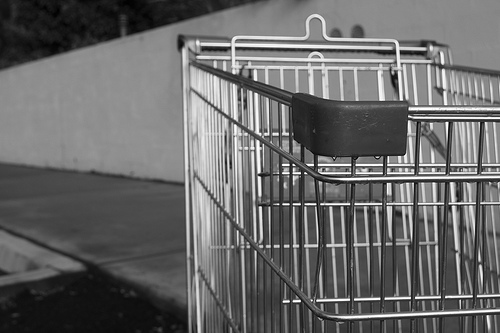Reduce $1000 GST threshold: commission

The Productivity Commission handed down its draft report into the retail sector this afternoon, recommending that the goods and services tax (GST)-free threshold be lowered to below $1000, after calls from major retailers around the country.

(Portrait of a Shopping Trolley image by Timothy Allen, CC BY-SA 2.0)
The draft report, released to the public today, looks into the globalisation of the retail sector and examines the implications of current policy settings on retailers, and how consumers are purchasing goods.
Currently, purchases made offshore by Australian consumers under the value of $1000 do not attract the mandatory 10 per cent GST. Local bricks and mortar retailers, including Harvey Norman's Gerry Harvey and Myer CEO Bernie Brookes, railed against the policy in January, claiming that the high Australian dollar meant that people would look to buy goods offshore using online stores.
The Productivity Commission found, in its investigations, that the $1000 GST-free threshold only acts as a "minor contributing factor to online offshore purchases by consumers".
Despite this, however, Productivity Commissioner Philip Weickhardt said in a statement today that the commission would suggest lowering the $1000 GST-free threshold for "reasons of tax neutrality ... but only once this can be done cost effectively".
"Under the existing processing systems for incoming parcels, the costs to process the extra parcels would far exceed the additional revenue raised. The commission is proposing that the Australian Government establish a task force to investigate lower cost approaches to processing in both the mail and courier systems, with a reporting deadline in 2012," Weickhardt added.
The report is sure to come as a boon to Gerry Harvey's consortium of bricks and mortar retailers, who even went as far as setting up their own offshore online stores so that they, too, could dodge the tax.
ZDNet Australia contacted Harvey's office for comment on the recommendations made today, but Harvey is out of the country.
Ruslan Kogan, Australian e-tailer and long-time nemesis of Gerry Harvey, said that he sees no problem with lowering the threshold.
"I see nothing wrong with the recommendation about lowering the GST threshold. If we can lower it and do so efficiently, it's a good thing to have a fair playing field.
"It doesn't affect Kogan in any way because all our products include GST," Kogan told ZDNet Australia today.
Kogan added that the report's revelations around the threshold reveal that Harvey and his band had run a null campaign.
"The Productivity Commission Report shows that retailers were using the GST threshold as a scapegoat. It makes it quite clear that the GST threshold is not the reason for the slowdown in traditional retail spending. People aren't shopping online for a saving of 5 per cent, they're shopping online for a saving of 50 per cent. Even if you increase this tax, people will still shop online, as it's still where the best deals will be found."
Aussie e-tail sector "underdeveloped"
The Productivity Commission has also said in its report that Australia has been slow to react to online sales trends, with local online stores accounting for only 6 per cent of total Australian retail sales.
"A number of market analysts ... claim that Australia lags overseas countries such as the US and the UK in terms of online share of total retail sales by two to three years," the report said.
"If so the experience of those countries may provide an indication of potential growth in online retailing in Australia."
The commission said, however, that if recent trends are to be believed, Australia's domestic e-tail sector is about to experience a boom time.
"While Australians have lagged overseas trends in online shopping in the past, they are rapidly catching up. The data show[s] that we spend more per capita on online shopping than the US, but lag the online shopping spend of people in the UK," it said. The UK's percentage of domestic online retail spending accounts for 11 per cent of the industry.
The Productivity Commission's prediction echoes predictions made by PayPal, which has said that the Australian e-tail sector is set to explode by 2012.
Vice president and managing director of eBay Australia Deborah Sharkey said that today's report from the Commission highlights the opportunity bricks and mortar retailers have to get online "in order to remain competitive and relevant to consumers".
The Productivity Commission's report is open for comments until 2 September.